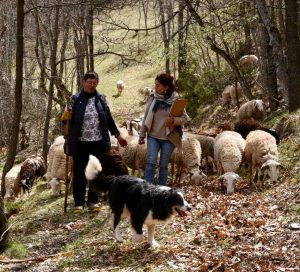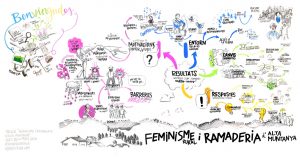 To address the relevant and under-investigated issues of gender, Traditional Ecological Knowledge (TEK) and adaptation to climate change, this proposal for research is framed by socio-ecological system and resilience theories integrated with a feminist philosophy of science and an intersectional feminist approach applied to agrarian setting.
To address the relevant and under-investigated issues of gender, Traditional Ecological Knowledge (TEK) and adaptation to climate change, this proposal for research is framed by socio-ecological system and resilience theories integrated with a feminist philosophy of science and an intersectional feminist approach applied to agrarian setting.
To address the relevant and under-investigated issues of gender, Traditional Ecological Knowledge (TEK) and adaptation to climate change, this proposal for research is framed by socio-ecological system and resilience theories integrated with a feminist philosophy of science and an intersectional feminist approach applied to agrarian setting (Carr and Thompson 2014) This research will be carried out through an exploratory mixed-method approach (Creswell, 2009). Different methods and tools applied from social and natural science (mixed information; qualitative and quantitative) will be performed following the categories of interest of this research: i) across men and women; ii) across different age groups; iii) across agricultural practices, i.e. agriculture (home garden, cereals), extensive livestock (pastoralism, silvopastoral) and gathering; iv) across family farmers applying different forms of management: agroecological, organic, extensive, intensive; v) across different institutional innovations along the agri-food chain (e.g. horizontal and vertical partnerships among private-public, collective actions etc.). A gender perspective and gender-sensitive methods will be applied through the whole project to identify potential: 1) gender differences in climate change risks and vulnerabilities; 2) gender differences in specific roles in the farms and practices, gendered institutions and knowledge, specific positions in social and economic networks in relation to power dynamics, gendered perceptions of outcomes ; 3) gendered assumptions and perceptions; 4) gendered differences in the opportunities, contributions, and alternatives offered by novel institutional arrangements in the rural world.
The first phase is aimed to review literature and databases from previous works in order to collect for Mediterranean Iberian context, and specifically for the studied areas, information on the key topics of the research. We will define climate change scenarios in the Mediterranean context, as well as the reported and projected impacts, defining the main social risks (especially linked to nutritional and food security) and vulnerabilities per groups of actors along with the four activities of the agrifood chain and adaptive strategies so far known.
The second phase is aimed to gather empirical field data in both sites on social and ecological dimensions that describe the structure and functioning of the local agri-food system configuration along with the activities of production, transformation, and distribution. To achieve objective 2 the research will adapt the SES (Ostrom 2009; MacGinnis and Ostrom 2014) applied to agri-food system which analyses the interactions along the food chain among components such as institutional arrangements /governance (G), actors and their socioeconomic and cultural characteristics (A), spatial boundaries (RS), ecological functioning (RU) and the external main drivers of change (S and ECO, identified in Phase I). Different qualitative (i.e. life histories, deliberative ethnography) and quantitative methods (i.e. inventory of knowledge and social networks) will be adopted. Participatory mapping will help local users and scientists to co-design the most relevant hypothesis to explore ecological dimension (i.e. biodiversity in crops, forest and pastures and pollinators).
 In the third phase the future projections of climate change and models of risks compiled in Phase I and the information previously collected will be used to prepare a series of multi-stakeholder workshops on a two-step (envisioning/ playing the game & backcasting) participatory modeling and scenario planning. The criteria and indicators to evaluate outcomes of future agrifood configurations (e.g. ecological resilience, social risks indicators, adaptive capacity indicators, equity indicators) under different drivers and scenarios will be identified and hypothesis on determinants (i.e. barriers and opportunities) for transformational adaptation will be discussed.
In the third phase the future projections of climate change and models of risks compiled in Phase I and the information previously collected will be used to prepare a series of multi-stakeholder workshops on a two-step (envisioning/ playing the game & backcasting) participatory modeling and scenario planning. The criteria and indicators to evaluate outcomes of future agrifood configurations (e.g. ecological resilience, social risks indicators, adaptive capacity indicators, equity indicators) under different drivers and scenarios will be identified and hypothesis on determinants (i.e. barriers and opportunities) for transformational adaptation will be discussed.
The fourth phase is organized around the communication and diffusion activities in the research, policy, and social arena. Apart from conventional dissemination, we will adopt arts-based media for engagement during the participatory activities in focus groups and workshops and for communication (e.g. comic, videos, exhibition, photobook).
Bibliography
- Carr E. and M. C. Thompson (2014). Gender and Climate Change Adaptation in Agrarian Settings. Current Thinking, New Directions, and Research Frontiers 8 (3): 182–197
- Creswell, J.W. (2009). Research design: qualitative, quantitative and mixed methods approaches. 3rd ed. Sage Publications, Inc., Los Angeles. 260 pp
- McGinnis, M. D., and E. Ostrom (2014). Social-ecological system framework: initial changes and continuing challenges. Ecology and Society 19(2): 30
- Ostrom E. (2009). A General Framework for Analyzing Sustainability of Social-Ecological Systems. Science 24: 419-422.
